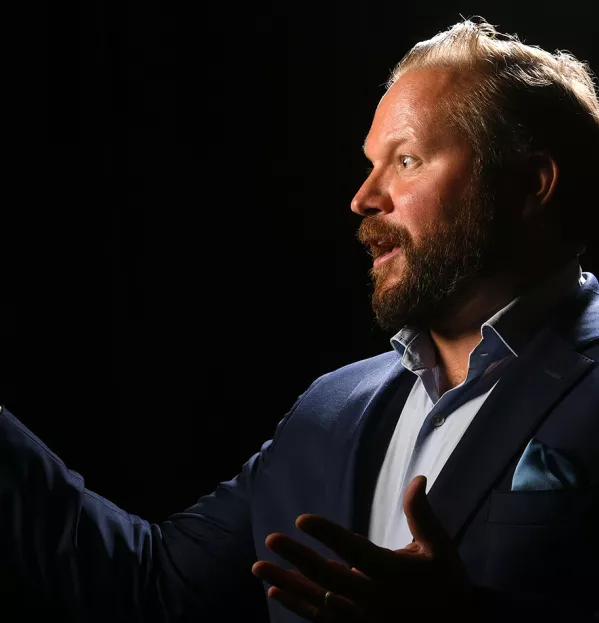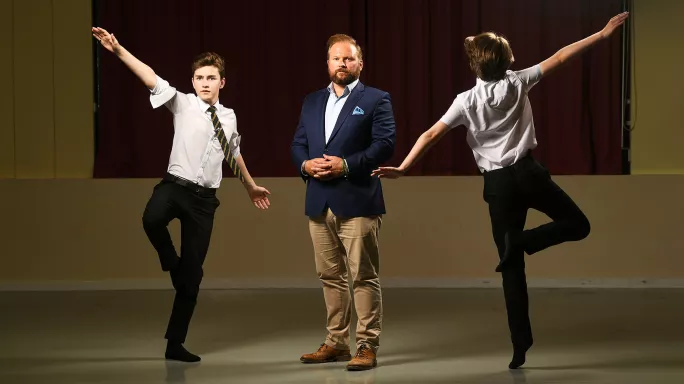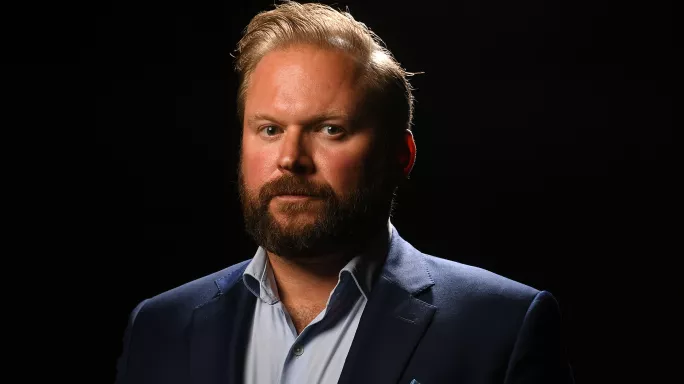10 questions with...Benedick Ashmore-Short

Benedick Ashmore-Short is chief executive officer of The Park Academies Trust, which runs five schools in Swindon - a mixture of secondaries and primaries. He previously ran Astrea Academy Trust.
A former grade eight ballet dancer, he has set up programmes in both of the trusts he has led to encourage boys to dance, with the aim of boosting their mental and physical health.
Answering Tes’ 10 questions, he talks about the need for “art and magic” in teaching, and why teachers working in the most deprived areas should be paid the most.
1. Who was your most memorable teacher and why?
I went to a state primary school and had a phenomenal headteacher called Mr Mansel, who had that wonderful energy of a man who you can look up to and respect but is also loving. He helped me, because I was quite a naughty boy at school.
I went from there to an all-boys independent school - Hampton School. It was very sporty, which was ideal for getting rid of a lot of my energy that sometimes could be misguided. I had two brilliant teachers: Mr McClane, who coached me football for a number of years, and also Mr Cross, who’d won a gold medal in the Olympics with [Sir Steve] Redgrave. He was a history teacher who excited you about history, and he had his gold medal hanging around at the bottom of his car.
But I also had a private life of lessons and teachers outside of school: I did a lot of ballet, and was potentially going to go to the Royal Ballet School. My ballet teacher was a wonderful lady called Miss Dawson, who took me through to grade eight ballet.
It was doing ballet that gave me a really good focus and enabled me to engage with the emotion that sometimes young boys find hard to engage with, but also with the idea of physical fitness and core strength. I played rugby and football, too, up to a high level - and that was complemented by the fact that I did ballet. For me, I liked the structure of ballet and making sure you had to nail all the individual components and skills that you needed along the way to make it look effortless. And I think that is a life skill.
So in my past trust [Astrea Academy Trust], we brought in the Rambert dance company and did ballet with boys in the North, and often their families. We’re doing a similar project now in Swindon with the trust I’m at, working with teenage boys, looking at ballet as an expression and linking it to mindfulness and healthy lives.
2. What were the best and worst things about your time at school?
I have utterly positive memories of school, though I’m not sure every teacher would have utterly positive memories of me. The best things for me were structure, sports, being excited and engaged and interested in the world, and not necessarily having to follow the curriculum.
I spent a lot of time on long school trips: from about the age of 14, we’d go away to Aberdeen and spend a week beasting ourselves up and down the sand dunes - no one was allowed to go home and have breakfast until every last person had been sick from physical activity. That discipline and being able to wear yourself out was really good in terms of focusing in other areas.

The worst part was, I wasn’t taught English particularly well. I’m a great reader now, I adore English as a subject. But I think I left school with a lack of interest…there was a sense of teaching from a curriculum, because that was what had to be followed.
I’m now a passionate advocate of freeing teachers to use the art and magic, not be prescriptive, not completely follow a curriculum to the nth degree.
3. Why do you work in education?
My mother was a head of English in tough comprehensives. My father was an international ballet and opera designer - so there were two draws on me throughout my life, I think.
But I did an economics degree, because all my friends did, and then I thought I’d go and work in the City while pursuing a career in TV. At 22 I was sat in a plane, drinking champagne on the way back from a business meeting in Frankfurt, and I thought, “This is the life.”
I then got down to the last couple of candidates to be a Blue Peter presenter. But, in the end, I didn’t get it.
At the same time, I sat down and thought, “What am I doing with my life? I’m not really giving anything back. I feel like I’m not achieving anything, just making money.”
So at that point, I immediately phoned up a university…and two weeks later I started a course in secondary maths.
I remember the first school I walked into. It was like a bombshell moment - I didn’t realise that all schools weren’t similar to my school. [What] still fills my reservoir of hope is making sure that we can do something…that is bringing an equality of opportunity to all children, regardless where they come from.
4. What are you proudest of in your career and what do you regret?
I’m really proud of the fact that I’ve taught from early years all the way through to Year 13. We [need to] understand the linear journey that a child goes through.
I’m also incredibly proud of the work that we did in South Yorkshire with Astrea Academy Trust: that was a trust that we [his wife, Libby Nicholas, was the founding CEO of Astrea] managed to pull together from scratch with Northern Powerhouse funding. We ended with 27 schools after four and a half years, and a huge turnaround in terms of academic results but, more importantly, 17 or 18 schools came out of special measures. The majority of those jumped to “good” - so a complete school transformation in some of the toughest communities out there.
I regret not being able to get into a position of power and responsibility where you can try and release the reins so that actually it’s easier to do the work in school.
5. If you could choose your perfect staffroom, who would be in it?
I would always aim for a staffroom buzzing with professional curiosity and the love of teaching but welcoming of competing views.
So Ted Wragg as the headteacher, Michael Gove as head of department for politics, Brian Cox [the physicist not the actor] for science, Pythagoras for maths, Eminem for English, Sarina Wiegman for PE, Coco Chanel for French, Banksy for art, Dan Snow for history, Jessica Nabongo for geography, and Maria Montessori for early years foundation stage.
6. What do you think are the best and worst aspects of our schools’ system?
The best aspect is the dedicated, passionate and deeply caring individuals we have in the workforce. We have a complex system, with many different structures. I’m agnostic about the best of these but do see that the most successful have individuals who collaborate in a meaningful way and harness the collective power of human love and endeavour.

The worst aspect is that the system is still constructed and judged in a way that makes limiting social deprivation and doing the best for our most vulnerable children structurally challenging.
7. Your own teachers aside, who in education has influenced you the most?
My wife is a huge inspiration in terms of her leadership in state and independent education [she is now managing director for Dukes Education, a group of independent schools].
My mother is a huge inspiration. I still remember, when I was unable to go to school because I was ill, I had to go to her tough state school and sit in a reading cupboard with a sniffle while she taught her lessons -- probably learning English in a better way than I was being taught in school.
Also, Sir David Carter [former national schools commissioner] was my line manager for Astrea. Being able to work with someone like that with his experience and understanding and knowledge - most importantly, underpinned by a compassionate love for education - was incredibly inspiring.
8. If you became education secretary tomorrow, what would you change?
If I could, I’d get the best teachers in front of the children who need them most - those areas that are lower socioeconomically. Having worked in those, they are the most challenging schools. I would inversely correlate the IDACI [Income Deprivation Affecting Children Index] indicator to pay scales. So basically, the higher the level of deprivation, the higher the salary.
I’d make sure that we extend the school care from 8am to 6pm. I think it’s really important, particularly in those areas where we want parents to work and be aspirational, to actually provide that wraparound childcare.
I’m very passionate about early years: the earlier we get to child, the better. So I would make as many free nursery places as possible.
I would make it illegal, if I could, for travel companies to increase holiday prices during holiday time. That means we’re going to have more children in school, fewer children on holidays [in term time] but also children still able to access those experiences that they should be having with families.
9. What will our schools be like in 30 years’ time?
I think they won’t look fundamentally that different. I think there will continue to be a wide range of schools, and a wide range of curriculum available. It is really important that there’s a standard exit examination that we stick to.
I think that we have to adapt to the impact that artificial intelligence is going to have - it may have some impact on curriculum.
My hope is that that the system is not radically overhauled but that it also allows children from disadvantaged backgrounds to advance into the discourse of their peers.
10. What one person do you think has made the most difference to our schools over the past year?
The work of Dame Rachel de Souza, as children’s commissioner, is so valuable, and she is a voice for those that are sometimes not listened to. This is particularly relevant to her recent work on attendance post-pandemic.
The other person would be Leora Cruddas in her role as chief executive of the Confederation of School Trusts. She has consistently brought intelligent thought, training and support into the academy sector. She always puts children at the heart of the work she does and provides an invaluable link between the sector and policy decisions.
You need a Tes subscription to read this article
Subscribe now to read this article and get other subscriber-only content:
- Unlimited access to all Tes magazine content
- Exclusive subscriber-only stories
- Award-winning email newsletters
Already a subscriber? Log in
You need a subscription to read this article
Subscribe now to read this article and get other subscriber-only content, including:
- Unlimited access to all Tes magazine content
- Exclusive subscriber-only stories
- Award-winning email newsletters
topics in this article



